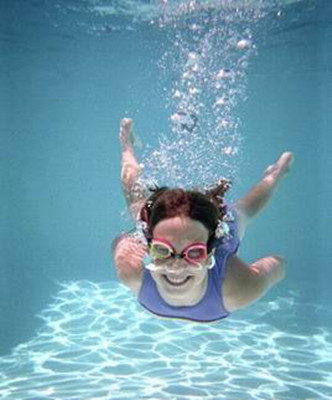Everybody loves the swimming pool.
每個人都喜歡游泳池。
But how clean is the water in the averagebackyard or public pool?
但是在一般的后院和游泳池的水有多清潔呢?
If you trust chlorine to take care of germs, you're in fora surprise.
如果你相信氯可以制服細菌,那么接下來的就會讓你驚奇。
Chlorine and other disinfectants do indeed help to clean the water, but somegerms can survive in even the best-kept pool.
氯和其它的消毒劑的確有助于清潔水,但是一些細菌在保護很好的水池里仍然可以存活。

For example,cryptosporidium may live in pool water for several days.
列如:隱孢子蟲可能在池水中生活很多天。
Crypto causes a diarrheal illness and may rinse off the bodies of infected people or diapered children into the pool.
隱孢子蟲能引起腹瀉,并且會從進入泳池的被感染病人或者帶尿布孩子的身上被沖刷下來。
If you swallow infected pool water, you may become sick.
如果你吞下被感染的池水,也會生病。
Other germs may live for a few minutes or a few hours in a chlorinated pool:
其它的細菌可能在氯化池里生存幾分鐘或者幾個小時:
Giardia, Shigella, and E. Coli may cause diarrheal illnesses.
鞭毛蟲,志賀氏菌,和大腸桿菌可能引起腹瀉。
Pseudomonas Aeruginosa may cause an ear infection calledswimmer's ear and also a skin infection called “hot tub rash,” that isusually associated with very warm pools and spas.
綠膿桿菌可能引起游泳性耳炎的耳朵感染以及熱浴池皮疹的皮膚感染。熱浴池皮疹通常與非常溫暖的水池和溫泉有關。
While keeping the correct chlorine and ph levels will minimize water-borneillness, prevention is also a good idea.
盡管保持正確的氯和pH值能夠減少通過水傳播的疾病,可是預防也是一個好主意。
Keep diapered children in the water for onlybrief periods and keep sick people out of the water altogether.
保持仍帶尿布的孩子在水中只停留短暫的時間,使病人遠離水。
And, don't everswallow pool water.
并且永遠不要吞下池水。











